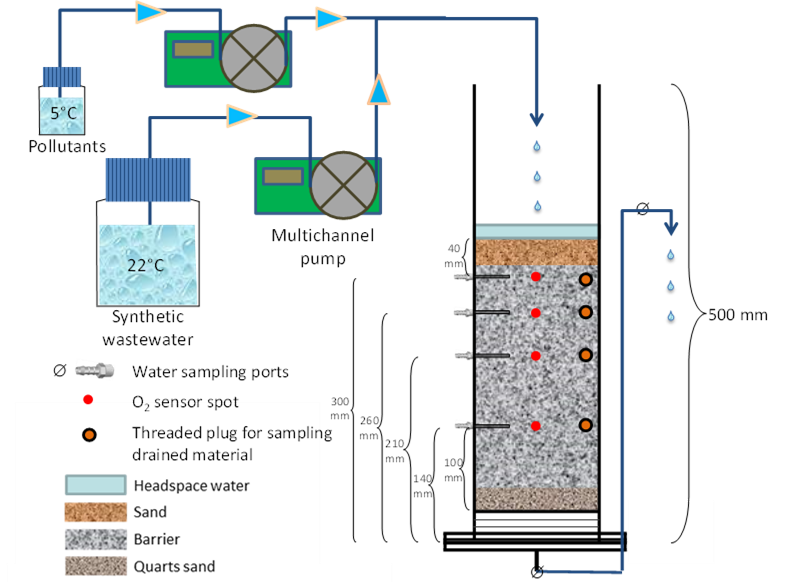Description of the Work Packages
WP1: Feasibility studies
Feasibility studies aims to develop common analytical tools to be used in both Denmark and South Africa. The research includes:
1) design and operation of a model filtration reactor system that simulates MAR
2) development of protocols for the analysis of organic pollutants, pathogenic indicators, and ARGs
3) feasibility studies and writing of joint scientific publication.
Several target organic pollutants will be selected based on compounds typically present in reclaimed, storm, and river waters including pharmaceuticals, antibiotics, and pesticide residues, with the emphasis on compounds present in the inlet water at the field-scale MAR facilities. Analytical protocols will be developed for these pollutants based on UPLC-MS and LC-HRMS. Common protocols for the analysis of indicator pathogens and ARGs will be developed as well, the latter using qPCR of selected antibiotic resistance genes (ARGs). The reactor system will be built as a series of columns (6-8) with heights of 0.5 m and diameters of approximately 6 cm (see figure), packed with sand, and seeded with fresh activated sludge from a local wastewater treatment plant. The system will function as submerged continuous flow fixed bed filters that can be operated at realistic hydraulic retention times being typical 12-24 h at MAR facilities. The columns will be equipped with sampling ports for sampling of filter material for e.g. nucleic acid extraction (DNA) and assessment of biofilm formation, and sampling of water for monitoring of O2, pH, organic pollutants, bacteria, ARGs, and other relevant parameters. The inlet will be synthetic reclaimed water added 5 to 10 organic pollutants.
The model MAR system will be used to test the feasibility of using barriers of e.g. compost, wood chips, or other residual materials to improve the attenuation of organic pollutants, pathogens, and ARGs. Furthermore, it will be tested whether addition of auxiliary carbon sources can stimulate cometabolic degradation of otherwise recalcitrant pollutants.
Figure 1: The MARSA Column set up
WP2: Effects of MAR on groundwater geochemistry and pretreatment requirements
Effects of MAR on groundwater geochemistry and pretreatment requirements focuses on how infiltration of different water sources affects aquifer geochemistry, including clogging, and how to monitor this. The research will use the same MAR model system as in WP1, but here it will be setup in South Africa with the same inlet water as used in WP3. First, the columns will be setup in a South African laboratory, later at Atlantis wastewater treatment plant or the Langebaan Road field site.
The model system will be used to study the effects of adding oxidising agents, fluctuating groundwater tables, and salinities on attenuation of organic pollutants, pathogens, and antibiotic resistance genes, metal release and precipitation (e.g. As, Ni, Fe, and Mn), and clogging. Pretreatment technologies commonly used at wastewater treatment plants will be identified and evaluated in terms of enhancing pollutant removal during MAR. Based on results from laboratory columns using the actual source water on location, the need for introducing such pretreatment technologies to obtain more efficient removal of contaminants will be suggested.
WP3: Field-scale studies
Field-scale studies aims at testing the concepts developed in WP1-2 at larger scale. Field-scale MAR studies will be carried out at the Langebaan road aquifer and Atlantis field sites using Berg River water or mixtures of reclaimed- and stormwater respectively as source waters. The field-scale studies will be carried out using infiltration ponds or in case approval of specific treatments options cannot be granted, by use of columns on location.
Infiltration ponds with reactive barriers for recharge of Berg River water will be established at the site and improvement of the water quality will be measured during groundwater discharge back to the river (See figure). Such system allows safe testing of the barrier concept and assessment of MAR for aquifer storage and recovery. Activities at the site include 1) establishment of infiltration ponds and monitoring wells, 2) selection of barrier material and treatment options based on results from WP1 and WP2, and 3) monitoring of selected parameters including organic pollutants, pathogens, and ARGs with time.
The Atlantis site already has an active MAR system that recharges a mixture of reclaimed water and stormwater via infiltration ponds to the groundwater. To investigate whether this system can be improved by the incorporation reactive barriers, columns will be setup on-site and fed real reclaimed water from the same wastewater treatment plant as used for the full-scale MAR facility.
Figure 3: Infiltration pond with monitoring wells. The Green line shows the reactive barrier.
WP4: Groundwater resource development by implementation of MAR in South Africa
Impacts of further implementation of MAR on the availability of groundwater for water supply in South Africa will be studied with focus on the West Coast District Municipality. The following tasks are included:
1) Modelling of the potential for MAR in the West Coast District Municipality taking into consideration MARSA technologies, available water resources, geology, and infiltration capacities
2) expansion of existing guidelines on MAR to South African conditions
3) identification of socio-economic preconditions including innovation preparedness among utilities and authorities and investment potentials, and legal requirements.
Socio-economic preconditions: To reach out and promote further use of groundwater and MAR in the public water supply in South Africa, the cost of improved MAR utilization will be estimated including expenses to pretreatments, feasibility studies, construction, and operation and maintenance. This will be combined with a detailed mapping of socio-economic preconditions and legal requirements, innovation preparedness among utilities and authorities, and investment potentials


